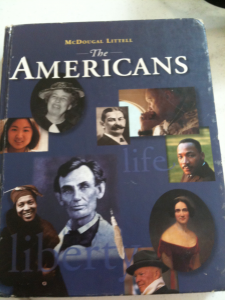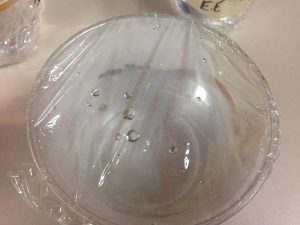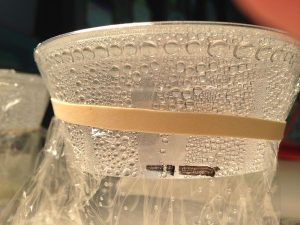Posted by kavery508 | Posted in Uncategorized | Posted on January 9, 2017
*Note: Our math facts quiz will be on Thursday this week instead of Friday.
 Meteorologist In The House! On Monday, we will be treated to an educational visit by meteorologist Barry Burbank from WBZ News! Mr. Burbank will be presenting and engaging second-graders on all things weather. You can look for us on WBZ, channel 4 on most providers, on Tuesday at 5 AM, 6 AM, and 6 PM.
Meteorologist In The House! On Monday, we will be treated to an educational visit by meteorologist Barry Burbank from WBZ News! Mr. Burbank will be presenting and engaging second-graders on all things weather. You can look for us on WBZ, channel 4 on most providers, on Tuesday at 5 AM, 6 AM, and 6 PM.
 This week’s new comprehension strategy is predicting. Always, the #1 thing we want students to do when they read for meaning is to think about the text. When we do that, we can’t help but make predictions–predictions about where a story is going next; predictions about what language or vocabulary we will likely encounter next; predictions about answers to our questions that arise when we read. Equally important is to check our predictions, or guesses, as we read on, and adjust our thinking accordingly. It’s what helps us learn new things and it makes us engage with text, building our lifelong learning skills. Here’s a short article on predicting with ideas for making connections to science at home: http://www.readingrockets.org/article/making-predictions
This week’s new comprehension strategy is predicting. Always, the #1 thing we want students to do when they read for meaning is to think about the text. When we do that, we can’t help but make predictions–predictions about where a story is going next; predictions about what language or vocabulary we will likely encounter next; predictions about answers to our questions that arise when we read. Equally important is to check our predictions, or guesses, as we read on, and adjust our thinking accordingly. It’s what helps us learn new things and it makes us engage with text, building our lifelong learning skills. Here’s a short article on predicting with ideas for making connections to science at home: http://www.readingrockets.org/article/making-predictions
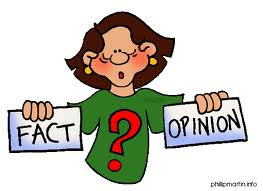 Our writing focus switches back to opinion writing. The eventual goal on the road to college and career readiness is for students to synthesize knowledge and present arguments that are supported with evidence. At this time, our kids are learning to write an introductory sentence on a topic; state an opinion; list 3 reasons that support it; write 1 or more explanations for each reason; and write a concluding sentence. Students will begin by writing opinions on any topic, then research and write opinion pieces on famous Americans. Speaking of which…
Our writing focus switches back to opinion writing. The eventual goal on the road to college and career readiness is for students to synthesize knowledge and present arguments that are supported with evidence. At this time, our kids are learning to write an introductory sentence on a topic; state an opinion; list 3 reasons that support it; write 1 or more explanations for each reason; and write a concluding sentence. Students will begin by writing opinions on any topic, then research and write opinion pieces on famous Americans. Speaking of which…
Our Term 2 Social Studies focus is on learning character traits and applying that knowledge to understand famous U.S. and world figures and their contributions. What makes these historical leaders worth remembering? How did Lincoln’s honesty, Cesar Chavez’ determination, Harriet Tubman’s bravery, and Susan B. Anthony’s patriotism affect the lives of others and forever change our understanding of America? These are the kinds of questions we will attempt to answer by analyzing biographical texts and media.
This week, we will analyze the life and achievements of Martin Luther King, Jr. (MLK) and learn to assign character traits to him based on evidence from biographical texts and video. Check out this great video from Brainpop (an awesome and highly engaging resource that I use a lot!) and keep the learning going at home: https://www.brainpop.com/socialstudies/ushistory/martinlutherkingjr/. Then consider these traits: determined; hardworking; patriotic; creative; honest; responsible; brave. Which words best apply to MLK? What is your evidence?
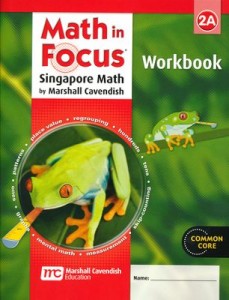 This week we begin chapter 7 of Math in Focus, the goal of which is to make students proficient with linear measurement (especially meters and centimeters). To begin, students will learn the importance of standard units of measurement and be introduced to content-specific vocabulary (width; height; length; meter; etc.). They will next develop a sense of how big meters and centimeters are. Then they will learn correct methods for estimating and accurately measuring and talking about measurement (more than, less than, about, exactly). And as always, they will be asked to solve real-world problems that require analysis and application of skills learned. Consider the following problem from this week’s lessons. Notice how it requires students to think about space, length, multiplication/repeated addition, and subtraction to solve it:
This week we begin chapter 7 of Math in Focus, the goal of which is to make students proficient with linear measurement (especially meters and centimeters). To begin, students will learn the importance of standard units of measurement and be introduced to content-specific vocabulary (width; height; length; meter; etc.). They will next develop a sense of how big meters and centimeters are. Then they will learn correct methods for estimating and accurately measuring and talking about measurement (more than, less than, about, exactly). And as always, they will be asked to solve real-world problems that require analysis and application of skills learned. Consider the following problem from this week’s lessons. Notice how it requires students to think about space, length, multiplication/repeated addition, and subtraction to solve it: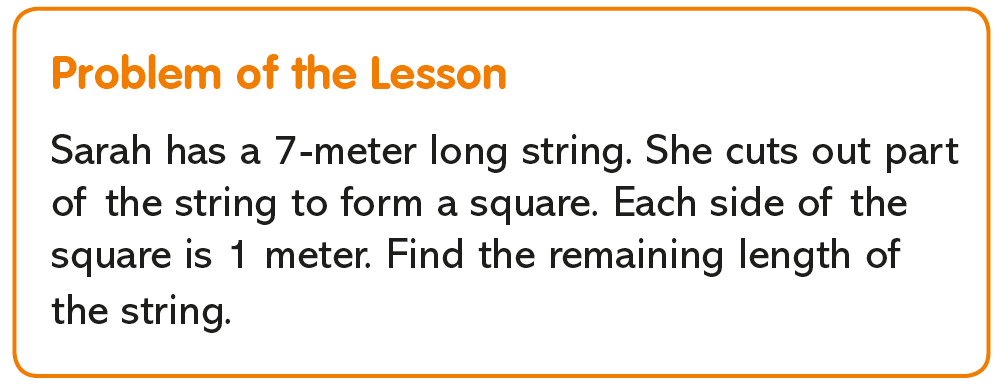
 In science, students did a fantastic job designing an experiment to test the claim that water evaporates due to energy in the form of heat. Using water in cups covered in plastic wraps, they made predictions; collected and analyzed observable data; and drew conclusions based on the same. This week we will use scientific investigation to answer these questions: Do all liquids evaporate like water? If not, can water evaporate out? What then is left behind? We will use water as a baseline and compare it to solutions of salt water and water with food coloring. Here’s a link showing how to do one such investigation at home: http://www.shirleys-preschool-activities.com/salt-solution-experiment.html. I encourage you to try other solutions (e.g. water and ???) and send us your results!
In science, students did a fantastic job designing an experiment to test the claim that water evaporates due to energy in the form of heat. Using water in cups covered in plastic wraps, they made predictions; collected and analyzed observable data; and drew conclusions based on the same. This week we will use scientific investigation to answer these questions: Do all liquids evaporate like water? If not, can water evaporate out? What then is left behind? We will use water as a baseline and compare it to solutions of salt water and water with food coloring. Here’s a link showing how to do one such investigation at home: http://www.shirleys-preschool-activities.com/salt-solution-experiment.html. I encourage you to try other solutions (e.g. water and ???) and send us your results!

